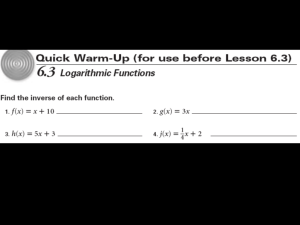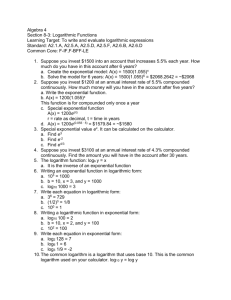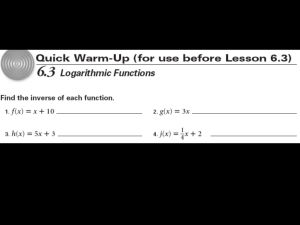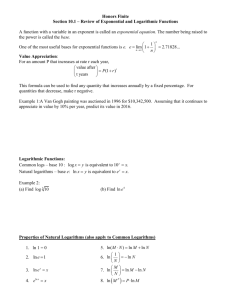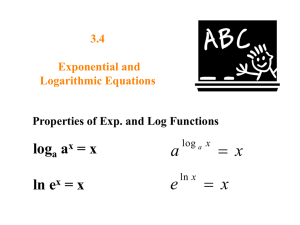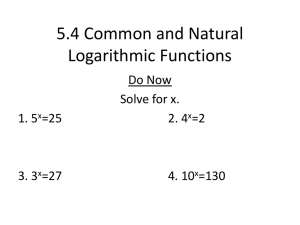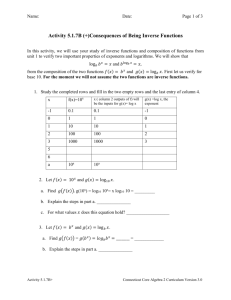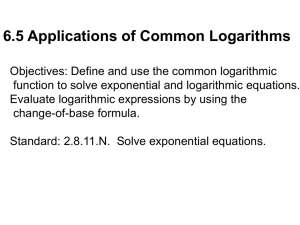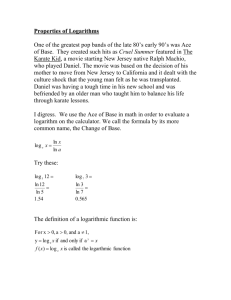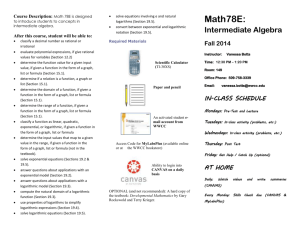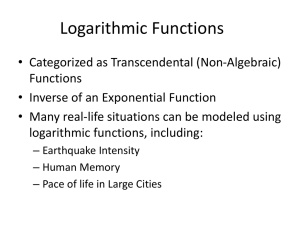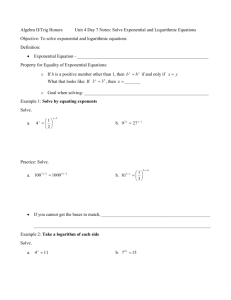6.3 - District 158
advertisement
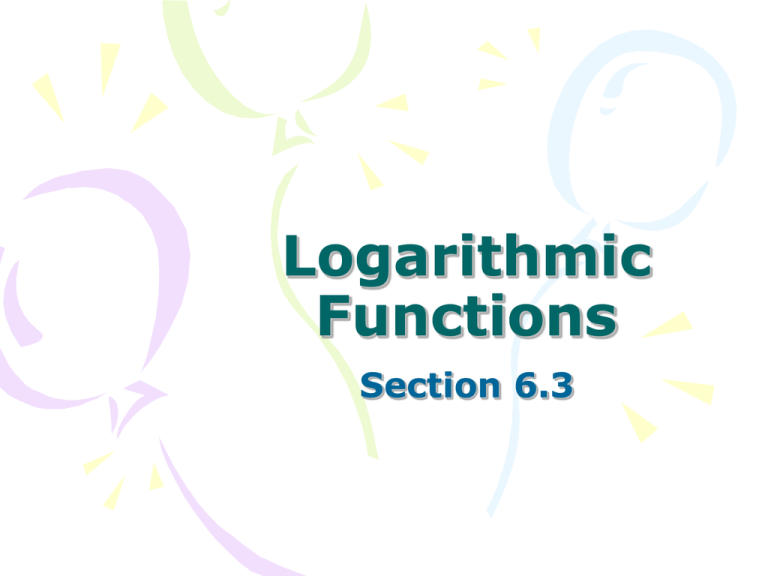
Logarithmic Functions Section 6.3 Use the table below. x -3 y=10x -2 -1 1 1 1 10 0 0 10 0 10 0 1 2 3 1 10 100 1000 • Use the table to find x in each equation. • A. 10x = 1000 • B. 10 x 1 10 0 • C. 10 x 1 • On your graphing calculator: – 1. Enter the equation y 1 10 x – 2. See the table of values for this equation by pressing 2nd table. – 3. What is 107? – 4. Now change the table setup so the x values change by 0.01 by pressing 2nd table set – 5. Arrow down to tbl and change to 0.01 – 6. Go back to the table and x approximate x for 10 2 5 • To solve an equation such as 10x = 85 or 10x = 2.3 a logarithm is needed. • With logarithms you can write an exponential equation in an equivalent logarithmic form. • Exponential form Logarithmic form • 103 = 1000 3 = log10 1000 base exponent Equivalent exponential and logarithmic forms • For any positive base b, where bx = y if and only if x = logb y b 1 • Examples: Write each equation in exponential form. • 1. log2 8 = 3 8 = 23 • 2. lo g 1 4 1 4 256 4 256 4 • 3. log39 = 2 • 4. log8512 = 3 • 5. log5625 = 4 32 = 9 83 = 512 54 = 625 • Write each equation in logarithmic form. • 1. 153 = 3375 log153375 = 3 • 2. 4 2 log42 = ½ • 3. 53 = 125 log5125 = 3 • 4. 2 7 3 log273= 1/3 • 5. 113 = 1331 log111331 = 3 1 2 1 3 Evaluate logarithmic expressions using your calculator • You can evaluate logarithms with a base of 10 by using the log key on a calculator. • Find the approximate value of each logarithmic function. Round to the nearest tenth. • 1. log10 870 = 2.9 • 2. log1098,560 = 5.0 • 3. log10.0000056 = -5.3 • Solve 10x = 85 for x. Round to the nearest hundredth. • Write the equation in logarithmic form and use the log key. • x = log10 85 1.93 • Solve 10x = 14.5 for x. Round to the nearest hundredth. • x = log10 14.5 x 1 .1 6 • Day 2 • Evaluate without a calculator. • Ex 1 lo g3 9 • Ex. 2 log10 10 0 0 • Ex. 3 log 1 4 • Ex. 4 log11 16 1 12 1 Day 2 • Case 2: Solving using rational exponents • When: Use when the variable is the base of an exponential expression. • How: Raise both side of the equation to the reciprocal of the power of the exponent. Examples. • Ex. 1 4 w 4 3 Ex 2. 1 3 m 2 64 3 w 64 w 1 3 3 2 2 23 3 3 m 6 4 m 16 • Ex. 3 1 64 1 64 1 4 64 3 n 3 Ex. 4 4 2 16 1 1 3 n 2 16 4 n 256 n 3 4 x 4 3 216 3 2 3 x 2 3 1 1 1 1 2 1 2 23 3 x x 36 • Case 3: One-to-One Property of Exponents: If bx = by, then x = y • When to use: bases are the same number or can be changed to the same number • How: set exponents equal. • Note: will be on non-calculator portion quiz/test • Ex. 1 5 x Ex. 3 7 5 3 x 7 • Ex. 2 2 x 8 2 x 2 2 x 2 x 9 9 3 3 9 3 3 2 x 1 2 3 2 x 1 4 x 2 6x 3 3 6x 6x 4 x 2 6x 2 2x x 1 Solve for v. • Write in exponential form and solve. • Ex. v = log125 5 • 125v = 5 • (53)v = 5 • 53v = 51 • 3v = 1 • v = 1/3 • Ex. 2v = 1 •v=0 • (remember: any base raised to the zero power = 1)
